最新人教版高中英语必修三导学案(全册 共5个单元 35页)
- 格式:docx
- 大小:77.11 KB
- 文档页数:35
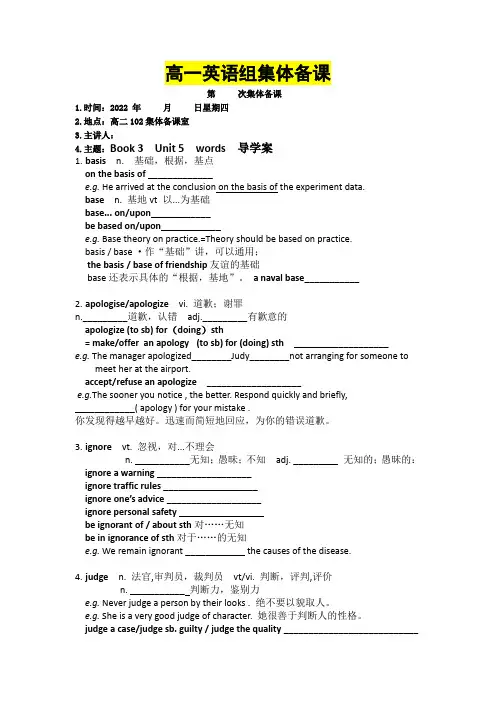
高一英语组集体备课第次集体备课1.时间:2022 年月日星期四2.地点:高二102集体备课室3.主讲人:4.主题:Book 3 Unit 5 words 导学案1.basis n. 基础,根据,基点on the basis of _____________e.g. He arrived at the conclusion on the basis of the experiment data.base n. 基地vt 以...为基础base... on/upon____________be based on/upon____________e.g. Base theory on practice.=Theory should be based on practice.basis/base·作“基础”讲,可以通用;the basis/base of friendship友谊的基础base还表示具体的“根据,基地”。
a naval base___________2.apologise/apologize vi. 道歉;谢罪n._________道歉,认错adj._________有歉意的apologize (to sb) for(doing)sth=make/offer an apology (to sb)for(doing) sth ___________________e.g. The manager apologized________Judy________not arranging for someone tomeet her at the airport.accept/refuse an apologize___________________e.g.The sooner you notice , the better. Respond quickly and briefly,____________( apology ) for your mistake .你发现得越早越好。
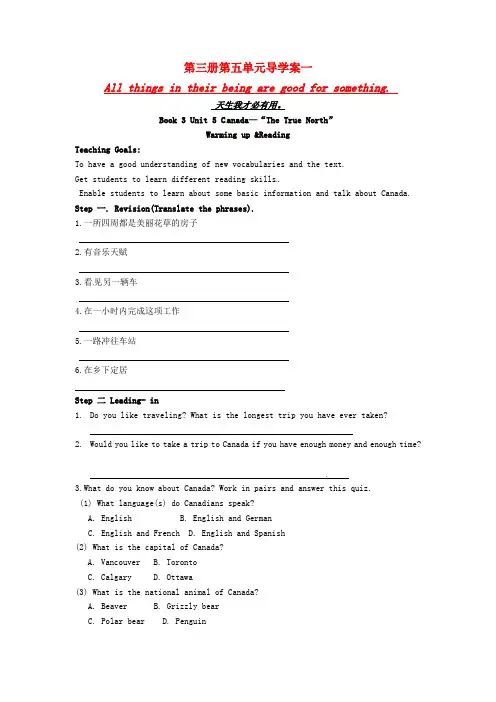
第三册第五单元导学案一All things in their being are good for something.天生我才必有用。
Book 3 Unit 5 C anada—“The True North”Warming up &ReadingTeaching Goals:To have a good understanding of new vocabularies and the text.Get students to learn different reading skills.Enable students to learn about some basic information and talk about Canada. Step 一. Revision(Translate the phrases).1.一所四周都是美丽花草的房子2.有音乐天赋3.看见另一辆车4.在一小时内完成这项工作5.一路冲往车站6.在乡下定居Step 二 Leading- in1.Do you like traveling? What is the longest trip you have ever taken?2.Would you like to take a trip to Canada if you have enough money and enough time?3.What do you know about Canada? Work in pairs and answer this quiz.(1) What language(s) do Canadians speak?A. EnglishB. English and GermanC. English and FrenchD. English and Spanish(2) What is the capital of Canada?A. VancouverB. TorontoC. CalgaryD. Ottawa(3) What is the national animal of Canada?A. BeaverB. Grizzly bearC. Polar bearD. Penguin(4) What is the Canadian leader called?A. PresidentB. Prime MinisterC. GovernorD. King(5) How many “Great Lakes” are there in Canada?A. 4B. 3C. 5D. 6(6) Filling in the form.Step 三1.What is the main idea of the passage?The passage is about a of two girls, and it tells us some information about .2.What does “The True North” refer to?a. .b. .c.3.How many cities are mentioned in the text? What are they?.4. Choose the best answer to each quest ion according to the text.(1)As you go eastward, you can see the following things except _ .A. mountainsB. thousands of lakesC. forests and wide riversD. cows(2)Who will take part in the Calgary Stampede? _A. Cowboys from Stampede.B. People fr om Canada.C. Anyone who has a gift for riding.D. Cowboys from all over the world.(3)Which of the following statements is true? _A. One c an cross Canada in less than five days by train.B. Many people think Calgary is the most beautiful city in Canada.C. In fact, the population of Canada is more than thirty million.D. Ocean ships cannot reach Thunder Bay.(4) Which of the following shows the right route of the cousin’s travel? _A. Toronto→Calgary→Vancouver→Thunder BayB. Vancouver→Calgary→Thunder Bay→TorontoC. Vancouver→Thunder Bay→Calgary→TorontoD. Toronto→Thunder Bay→Calgary→Vancouver5. Complete the summary of the story with one word in each blank.Li Daiyu and Liu Qian were on a ___________ across Canada. Instead of taking the aeroplane ______________ t he way, they would cross the whole continent of Canada in a ______________ after arriving Vancouver by air. Danny Lin waited ______________ them at the airport and gave them a brief ______________ about Canada, the second ______________ country in the world and Vancouver, the most beautiful city of the country, while taking them to ______________ the train, “The True North”.Having settled ______________ in the seats, they looked out of the window ______________ the wild scenery, the mountain goats, and grizzly bears. They went by the city of Calgary and ______________ in Thunder Bay, a city at the ______________ of the Great Lakes, learning more about Canada of its population resources and so ______________. Their last stop is Toronto, one of the southernmost cities in Canada. Step 四 DiscussingIf someday your friend goes to Canada , where will you recommend him to go? Why?..Step 五Te sting1. Can you help me? My _________(行李)is too heavy.2. We need to _________(测量)the length of the window for new curtains.3. My father traveled _________(在……上)a train.4. They moved the local people and _________(安排)them in another place.5. It is pleasant to _________(聊天)with friends.6. Make sure you _________(设法做)to finish this work before the end of the month.7. I won’t calm down until he is out of _________(视线).8. There was a _________(稍微)increase in her weight after the winter holidays.9. This group of mountains _________(环绕)each other so that it is quite easy to get lost here.10. The _________(风景)was so beautiful that it was almost beyond description.。
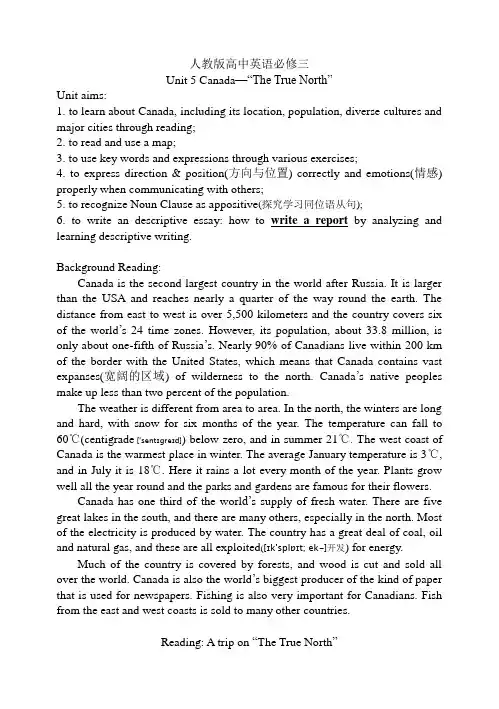
人教版高中英语必修三Unit 5 Canada—“The True North”Unit aims:1. to learn about Canada, including its location, population, diverse cultures and major cities through reading;2. to read and use a map;3. to use key words and expressions through various exercises;4. to express direction & position(方向与位置) correctly and emotions(情感) properly when communicating with others;5. to recognize Noun Clause as appositive(探究学习同位语从句);6. to write an descriptive essay: how to write a report by analyzing and learning descriptive writing.Background Reading:Canada is the second largest country in the world after Russia. It is larger than the USA and reaches nearly a quarter of the way round the earth. The distance from east to west is over 5,500 kilometers and the country covers six of the world’s 24 time zones. However, its population, about 33.8 million, is only about one-fifth of Russia’s. Nearly 90% of Canadians live within 200 km of the border with the United States, which means that Canada contains vast expanses(宽阔的区域) of wilderness to the north. Canada’s native peoples make up less than two percent of the population.The weather is different from area to area. In the north, the winters are long and hard, with snow for six months of the year. The temperature can fall to 60℃(centigrade ['sentɪgreɪd]) below zero, and in summer 21℃. The west coast of Canada is the warmest place in winter. The average January temperature is 3℃, and in July it is 18℃. Here it rains a lot every month of the year. Plants grow well all the year round and the parks and gardens are famous for their flowers.Canada has one third of the worl d’s supply of fresh water. There are five great lakes in the south, and there are many others, especially in the north. Most of the electricity is produced by water. The country has a great deal of coal, oil and natural gas, and these are all exploited([ɪk'splɒɪt; ek-]开发) for energy.Much of the country is covered by forests, and wood is cut and sold all over the world. Canada is also the world’s biggest producer of the kind of paper that is used for newspapers. Fishing is also very important for Canadians. Fish from the east and west coasts is sold to many other countries.Reading: A trip on “The True North”Leaning aims1. to get the main idea of each paragraph by scanning;2. to make judgments about details by careful reading;3. to summarize the passage.Step I Scan the passage and finish Task 1 and Task 2.Task I Find the main idea of each paragraph( ) Para 1 A. the train went southward to Toronto.( ) Para 2 B. Their friend Danny Lin met them at the station and helped them to get to the station. On the way, Danny toldthem a lot of information about Canada.( ) Para 3 C. The two girls went through a wheat-growing province and then back to the port city of Thunder Bay.( ) Para 4 D. Li Daiyu and Liu Qian went to visit their cousins byflying to Vancouver first, and then taking the train acrossthe whole continent.( ) Para 5 E. When they crossed the Rocky Mountains, the girls sawmany animals. Then they went to Calgary.Task II Answer the following questions1. What is “The True North according to the text?A. The northern part of CanadaB. The name of a part of CanadaC. The name of the train that goes across CanadaD. The name that they call the whole country2. The sentence “Canada is quite empty” tells us that _____.A. Canada has few resourcesB. most Canadians prefer to live abroadC. farms in Canada are extremely large in sizeD. Canada has a small population for its large sizeStep II Read the passage carefully and finish the following two tasks.Task 1. Read the passage again and judge True or False questions.1. Li Daiyu and Liu Qian went to Canada to see their parents in Montreal.2. You can’t cross Canada in less than five days by train.3. Cowboys compete in the Stampede to win thousands of dollars in prizes.4. The population of Canada is over 33,000,000.5. Canada has two-thirds of the world’s total fresh water.Task 2. Correct the mistakes in the following passage(10 in total) Li Daiyu, together with her cousin, were on a trip to Canada. Rather thantake the plane all the way, they decided to first fly and then took the train across the continent, that they thought would be excited.Going eastward, and they passed mountains and thousand of lakes and forests, as well as wide rivers and big cities. Among them, Vancouver is the most beautiful, surrounding by mountains and the Pacific Ocean, whose population is increased rapidly. Its coast is so wet that the trees are extremely tall, some measure over 90 meters. In another city, cowboys from all the world come to compete for the horse riding races(Stampede). Then they went on their journey…Step III Retell: what Canada is like according to the given clues.second33.85,500sixtwoone third(A complete sentence is suggested)Step IV. Assignment: Summary of the passageLi Daiyu and Liu Qian were 1._______ a trip across Canada. 2._________ of taking the aeroplane all the way, they would 3._________ Canada by train after arriving in Vancouver by air. Canada is the second 4.__________(large) country in the world. It is 5,500 kilometres from coast to coast. As they went5.____________, they saw beautiful scenery, as well as large cities. Vancouver6.________________(surround) by mountains and the Pacific Ocean.7.______ _________(settle) down in their train seats, they looked out of the window at some mountains goats and a grizzly bear and an eagle. They went by the city of Calgary. It is famous for the Calgary Stampede. Many of the cowboys8.______ (take) part in the competition there have a9.____________ for riding horses. Then they arrived in Thunder Bay, a city at the top of the Great Lakes, and learned even more about Canada ant its 10.____________(nature) resources. Step V. Language using1. Rather than take the aeroplane all the way, they decided to fly to… and then take the train west to east across Canada.rather than______________ (多用于连接并列成分)e.g. (1) He was busy writing a letter rather than _________(watch) TV.(2) She would ___________________________________(宁死不屈).Rather than ___________________(坐车上学), he preferred to walk to school./go to school on foot.(3) I think Tom, rather than you, ______(be) to blame.The father rather than the brothers ______(be) responsible.(4) I would rather you came tomorrow than today.I’d rather you had told him the news that day. 观察动词形式,总结一下。
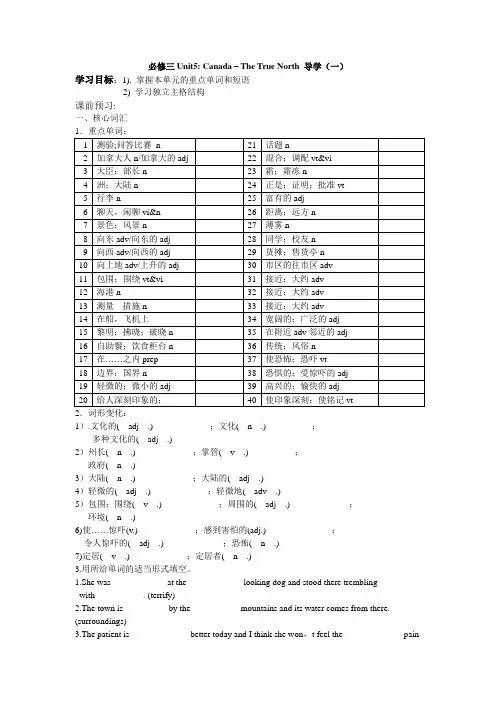
必修三Unit5: Canada – The True North 导学(一)学习目标:1). 掌握本单元的重点单词和短语2) 学习独立主格结构课前预习:一、核心词汇1 测验;问答比赛n 21 话题n2 加拿大人n/加拿大的adj 22 混合;调配vt&vi3 大臣;部长n 23 霜;霜冻n4 洲;大陆n 24 正是;证明;批准vt5 行李n 25 富有的adj6 聊天,闲聊vi&n 26 距离;远方n7 景色;风景n 27 薄雾n8 向东adv/向东的adj 28 同学;校友n9 向西adv/向西的adj 29 货摊;售货亭n10 向上地adv/上升的adj 30 市区的往市区adv11 包围;围绕vt&vi 31 接近;大约adv12 海港n 32 接近;大约adv13 测量措施n 33 接近;大约adv14 在船,飞机上34 宽阔的;广泛的adj15 黎明;拂晓;破晓n 35 在附近adv邻近的adj16 自助餐;饮食柜台n 36 传统;风俗n17 在……之内prep 37 使恐怖;恐吓vt18 边界;国界n 38 恐惧的;受惊吓的adj19 轻微的;微小的adj 39 高兴的;愉快的adj20 给人深刻印象的;40 使印象深刻;使铭记vt2.词形变化:1).文化的(adj.)_____________;文化(n.) __________;多种文化的(adj.)_______________2)州长(n.)_____________;掌管(v.) __________;政府(n.)________________3)大陆(n.)_____________;大陆的(adj.) _____________4)轻微的(adj.)_____________;轻微地(adv.) _____________5)包围;围绕(v.)_____________;周围的(adj.) _____________;环境(n.)_________________6)使……惊吓(v.)_____________;感到害怕的(adj.) _____________;令人惊吓的(adj.) _____________;恐怖(n.)_____________7)定居(v.)_____________;定居者(n.) _____________3.用所给单词的适当形式填空。
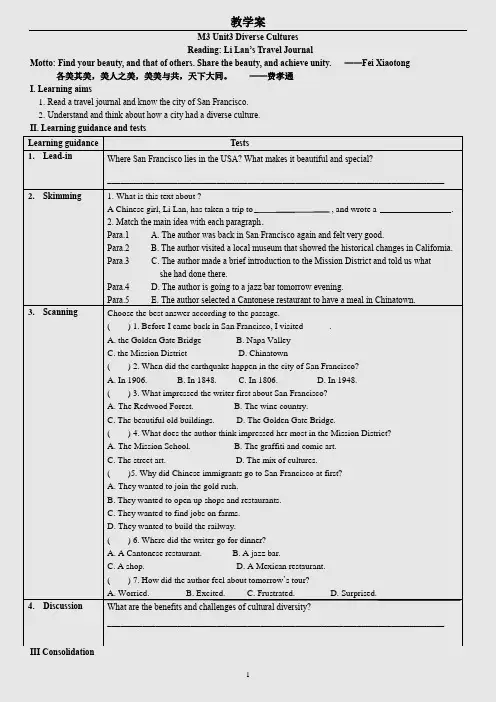
M3 Unit3 Diverse CulturesReading: Li Lan’s Travel JournalMotto: Find your beauty, and that of others. Share the beauty, and achieve unity. ——Fei Xiaotong 各美其美,美人之美,美美与共,天下大同。
——费孝通I. Learning aims1.Read a travel journal and know the city of San Francisco.2.Understand and think about how a city had a diverse culture.II. Learning guidance and testsLearning guidance Tests1.Lead-in Where San Francisco lies in the USA? What makes it beautiful and special?_____________________________________________________________________________2.Skimming 1.What is this text about ?A Chinese girl, Li Lan, has taken a trip to , and wrote a .2. Match the main idea with each paragraph.Para.1 A. The author was back in San Francisco again and felt very good.Para.2 B. The author visited a local museum that showed the historical changes in California.Para.3 C. The author made a brief introduction to the Mission District and told us whatshe had done there.Para.4 D. The author is going to a jazz bar tomorrow evening.Para.5 E. The author selected a Cantonese restaurant to have a meal in Chinatown.3.Scanning Choose the best answer according to the passage.( ) 1. Before I came back in San Francisco, I visited______.A. the Golden Gate BridgeB. Napa ValleyC. the Mission DistrictD. Chinatown( ) 2. When did the earthquake happen in the city of San Francisco?A. In 1906.B. In 1848.C. In 1806.D. In 1948.( ) 3. What impressed the writer first about San Francisco?A. The Redwood Forest.B. The wine country.C. The beautiful old buildings.D. The Golden Gate Bridge.( ) 4. What does the author think impressed her most in the Mission District?A. The Mission School.B. The graffiti and comic art.C. The street art.D. The mix of cultures.( )5. Why did Chinese immigrants go to San Francisco at first?A. They wanted to join the gold rush.B. They wanted to open up shops and restaurants.C. They wanted to find jobs on farms.D. They wanted to build the railway.( ) 6. Where did the writer go for dinner?A. A Cantonese restaurant.B. A jazz bar.C. A shop.D. A Mexican restaurant.( ) 7. How did the author feel about tomorrow’s tour?A. Worried.B. Excited.C. Frustrated.D. Surprised.4. Discussion What are the benefits and challenges of cultural diversity?_____________________________________________________________________________III ConsolidationLevel A Summary Today, I arrived back in San Francisco, and it feels good (1)_________ (be) back in the city again. The city succeeded in (2)_________ (rebuild) itself after the earthquake that (3)_________ (occur) in 1906, and I stayed in the Mission District, enjoying some delicious noodles mixed with cultures.In the afternoon, I headed to a local museum (4)_________ showed the historical changes in California. During the gold rush, many Chinese arrived, and some opened up shops and restaurants in Chinatown to earn a (5)_________(live). Many others worked on (6)_________ (farm), joined the gold rush, or went to build the railway that connected California to the east. The museum showed us (7)_________America was built by immigrants from (8)_________(difference) countries and cultures.In the evening, I went to Chinatown, and ate in a Cantonese restaurant that served food on (9)_________(beauty) china plates. Tomorrow evening, I’m going to (10)_________ jazz bar in the Richmond District.Level B 阅读七选五Small talk is a short conversation we have at parties, while we wait in line in a store, at family events or work. Sometimes we make small talk with people we know but not well. Often we have to make small talk with completestrangers. ______. Here are some tips to improve your ability to make small talk._______If you have seen a really good movie or have read a really good book, you can talk about that.When you are sharing the same experience with someone, it’s easy to start a conversation. You simply notice and comment on what ’s going on around you. For example, if you are at a party and a song comes on that you like or that reminds you of something, you can talk about that.Ask open -ended questions.These types of questions require more thought and more than a simple yes or no answer. _______, the conversationwill go on longer.Become a student.Nobody knows everything. So, as someone is answering one of your open -ended questions, they bring up somethingabout which you know nothing. So tell them! This lets the other person become the teacher. _______. It’s a win -winsituation.Like anything, being good at making small talk takes practice._______, you may find it easy. If you make small talkusing English, you will definitely improve your speaking and listening skills.A. Have some conversation starters ready.B. However, some people are not good at small talk.C. If you make small talk in your native language.D. If you ask questions that need more details to answer.E. You can talk about something that you recently learned.F. Many people find these small conversations about random topics easy.G. They feel good about sharing their knowledge and you get to learn something.1 2 3 4 5。
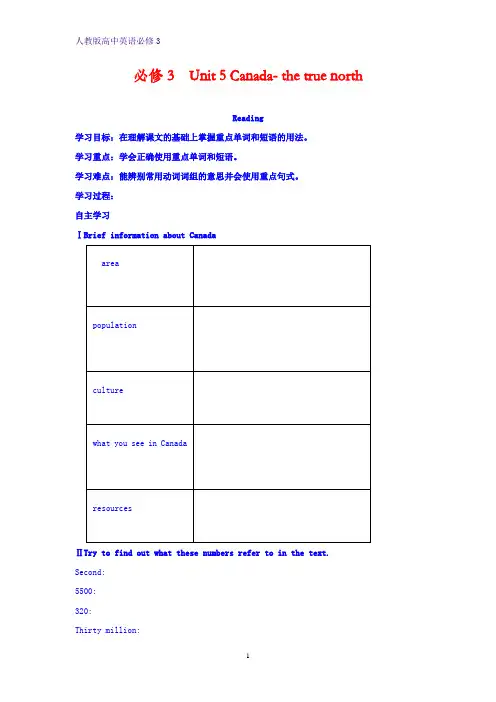
必修3 Unit 5 Canada- the true northReading学习目标:在理解课文的基础上掌握重点单词和短语的用法。
学习重点:学会正确使用重点单词和短语。
学习难点:能辨别常用动词词组的意思并会使用重点句式。
学习过程:自主学习ⅠBrief information about CanadaⅡTry to find out what these numbers refer to in the text. Second:5500:320:Thirty million:One third:Ⅲ Fill in the blanks.Li Daiyu and liu Qian took the train in Canada from ______to _________. Their cousin’s friend, Danny Lin, took them to the train station to catch “____ ____ _________.”Canada is the _______ largest country in the world. It is 5500 kilometers from ________ to ________. As they go _________, they saw beautiful scenery as well as cities. Vancouver is ___________ by mountains on the north and east. When the cousins_______ _________ in the seats, they looked out of the window. They saw mountain goats and even a _____ bear.ⅣO Canada!Our home and native land!True patriot love in all thy sons command.With glowing hearts we see thee rise,The True North strong and free!From far and wide,O Canada, we stand on guard for thee.God keep our land glorious and free!O Canada, we stand on guard for thee.O Canada, we stand on guard for thee.啊加拿大!我们的家园与故土!你的儿女,忠诚爱国。
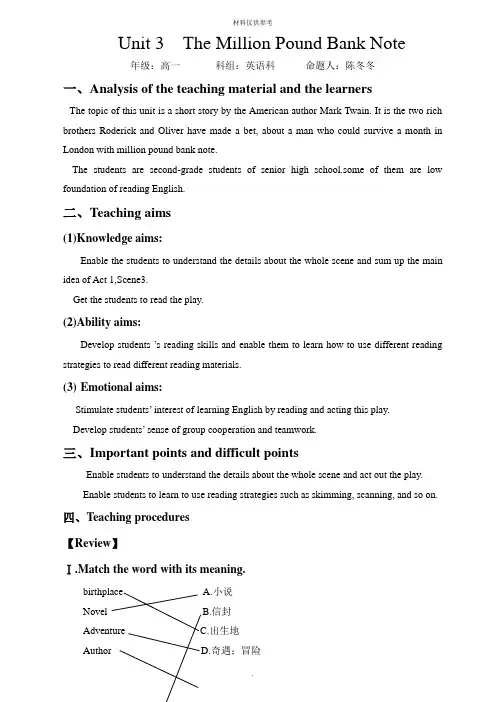
Unit 3 The Million Pound Bank Note年级:高一科组:英语科命题人:陈冬冬一、Analysis of the teaching material and the learnersThe topic of this unit is a short story by the American author Mark Twain. It is the two rich brothers Roderick and Oliver have made a bet, about a man who could survive a month in London with million pound bank note.The students are second-grade students of senior high school.some of them are low foundation of reading English.二、Teaching aims(1)Knowledge aims:Enable the students to understand the details about the whole scene and sum up the main idea of Act 1,Scene3.Get the students to read the play.(2)Ability aims:Develop students ’s reading skills and enable them to learn how to use different reading strategies to read different reading materials.(3)Emotional aims:Stimulate students’ interest of learning English by reading and acting this play.Develop students’ sense of group cooperation and teamwork.三、Important points and difficult pointsEnable students to understand the details about the whole scene and act out the play.Enable students to learn to use reading strategies such as skimming, scanning, and so on.四、Teaching procedures【Review】Ⅰ.Match the word with its meaning.birthplace A.小说Novel B.信封Adventure C.出生地Author D.奇遇;冒险Scene E.探究;寻求wander F.著者;作家Permit G.耐性;忍耐Fault H.漫游;闲逛;漂泊Spot I.过错;缺点;故障Seek J.发觉;认出;斑点Patience K.许可;同意;通行证;执照Envelope L.〔戏剧〕一场;现场;场面;景色Ⅱ.write down the meaning of the phrases in each sentence.1.The Smiths are praised for the way they bring up their children. 〔抚养〕2.Go ahead for two blocks,then turn left. 〔前进〕3.I found the key by accident when I was cleaning the room. 〔偶然〕4.In the West people think it’s rude to stare at a person. 〔盯着看〕5.Good luck accounts for her being famous overnight. 〔解释〕6.It doesn’t seen ugly to me;on the contrary, I think it’s rather beautiful. ( 相反) Step1 Leading inQ1: Do you like movies?Q2 :Which movies is the picture standing for?(图略)Step2 While—ReadingTask1:【Scanning】Read the narrator together and try to find the 4“W〞.(P1)(1)When:(2)Where:(3)What:(4)Who:Task2:【skimming 】1.listen to the tape,underline the words you have heard and tell me what are they.(主要人物关系思维导图〕(line28-34)2.Summarize the backgroundHenry was an ___①___.One day he had an accident in a ②_ _.Luckily he was survive by a ship for ③.He arrived in London by earning his passage without pay,He was ④in the street .To his surprise,an incredible thing happened.Two ⑤brothers gave him a million pound bank-note because they had made a ⑥.Task3:1.Role play(line41-56)2.Others think and discuss the following questions(1)What do you think of Henry and the two brothers?㈠For Henry:“well, it may seen luck to you but not to me〞“If this is your idea of some kind of joke,I don’t think it’s very funny〞“Now,if you’ll excuse me, I think I’ll be on my way〞( direct/frank )“I do not want your charity.I just want an honest job〞(hard-working )㈡The two brothersRich:Naughty :Good judges of a man:Step3 Conclusion:Put the following event in correct order:A、Henry wandered in London streets.B、About a month ago Henry Adams was sailing out of the bay.C、The next morning he was spotted by a ship.D、Towards nightfall he found himself carried out to sea by a strong wind.E、On the ship he earned his passage by working as an unpaid hand.。
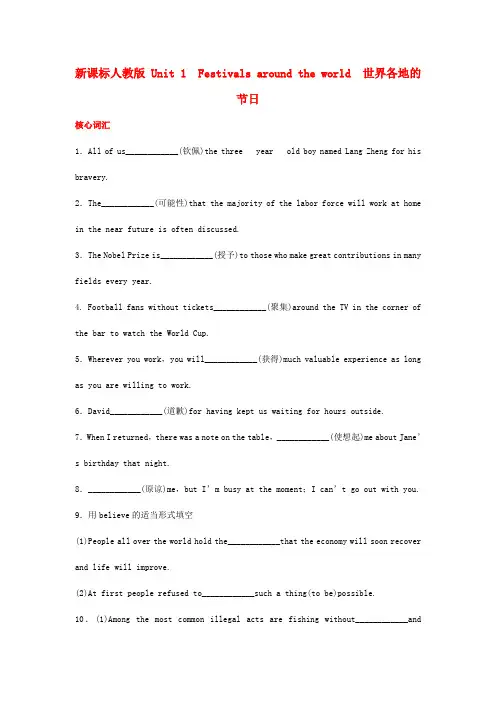
新课标人教版 Unit 1 Festivals around the world 世界各地的节日核心词汇1.All of us____________(钦佩)the three year old boy named Lang Zheng for his bravery.2.The____________(可能性)that the majority of the labor force will work at home in the near future is often discussed.3.The Nobel Prize is____________(授予)to those who make great contributions in many fields every year.4. Football fans without tickets____________(聚集)around the TV in the corner of the bar to watch the World Cup.5.Wherever you work,you will____________(获得)much valuable experience as long as you are willing to work.6.David____________(道歉)for having kept us waiting for hours outside. 7.When I returned,there was a note on the table,____________(使想起)me about Jane’s birthday that night.8.____________(原谅)me,but I’m busy at the moment;I can’t go out with you. 9.用believe的适当形式填空(1)People all over the world hold the____________that the economy will soon recover and life will improve.(2)At first people refused to____________such a thing(to be)possible.10.(1)Among the most common illegal acts are fishing without____________andcatching more than the limit?(permit)(2)Since you have a____________,would you like to go fishing if time____________.(permit)1.admire2.possibility3.awarded4.gathered5.gain6.apologized7.reminding8.Forgive9.(1)beliefssion (2)believe10.(1)permission (2)permit;permits高频短语1.________________ 发生2.________________ 纪念;追念3.________________ 盛装;打扮;装饰4.________________ 搞恶作剧;诈骗;开玩笑5.________________ 期望;期待;盼望6.________________ 日夜;昼夜;整天7.________________ 好像8.________________ 玩得开心9.________________ 出现;到场10.________________ 守信用;履行诺言11.________________ 屏息;屏气12.________________ 出发;动身;使爆炸13.________________ 使……想起……1.take place 2.in memory of 3.dress up 4.play a trick on 5.look forward to 6.day and night 7.as though 8.have fun with 9.turn up 10.keep one’s word11.hold one’s breath 12.set off 13.remind...of...重点句式1.At that time people would starve if food____________,especially during the cold winter months.在当时,如果食物难以找到,人们就会挨饿,特别是在寒冷的冬季。

四、第三关,词汇探究(将第一篇、第二篇文章中带黑体部份词汇的短语或句子划出并翻译出来.由小组长带领、落实、检查,课前完成)闯过第三杲,证明你已县韦険於的自修习横/五、第四关,词汇运用(A层造句,B层、C层可借助词典和教辅材料完成,讨论展示,教师点评)1.on the contrary—2.stare at一3.Iose one's patience—4.br i ng up——5.by accident—6.permit—7.unbeI i evabIe——8.apo I ogy—9.as for一10.make a bet——你已过四果,已鏈是眾优建的曇望了/%1.文学知识拓展What do you know about Mark Twa i n and h i s works?Book 3 Unit31. 3. 5. 7. 9. 语 11. 13. 15. 17. ____________ v.鞠躬,弯腰____________ n. 出生地____________ n. 故障;毛病____________ v. 许可;允许____________ n. & v.冒险____________ adv. Certainly; actually____________ vt.发现 n.地点____________ n.方式;习惯 v.凝视;盯着看2. _____________ n.理发店 4. _____________ n.作者;创始人 6. _____________ n.帐目,理由 8. _____________ v.漫步,徘徊 10. ______________ n.短语,习语,惯用12. _____________ n.数量;总额 14. _____________ n.(戏)一场;场面 16. ______________ n.通道;文章18. n. 品The Million Pound Bank Note 导学案(一)——词汇闯关 编制人 王维乖 审核人: 李炜鸣 审批人:吴培峰[Introductio n 】1. Preview the new words and expressions. Memorize 30 key words2. Finish four tasks3. Be active in class activities[Learning aim 】1. Pronounce and spell the new words and expressions correctly2. Try to remember the words and expressions3. Learn to use the bold words and phrases4. Make preparations for the text.一、 优化词汇和词义(由教师提前完成)二、 第一关,拼读单词(由学生课前自学完成,附录音。
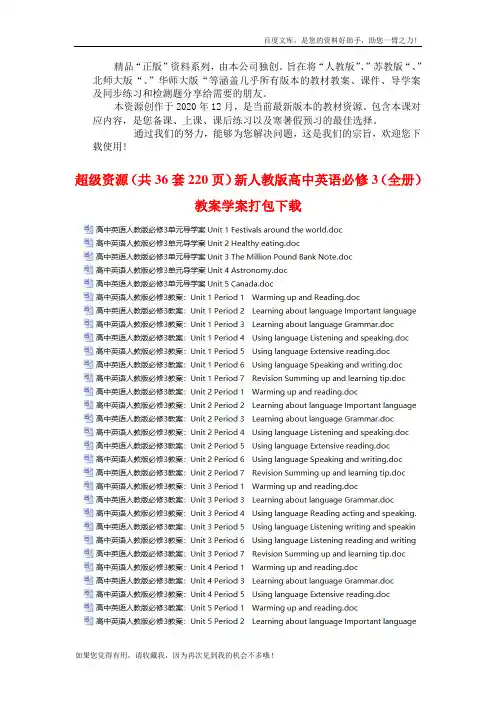
精品“正版”资料系列,由本公司独创。
旨在将“人教版”、”苏教版“、”北师大版“、”华师大版“等涵盖几乎所有版本的教材教案、课件、导学案及同步练习和检测题分享给需要的朋友。
本资源创作于2020年12月,是当前最新版本的教材资源。
包含本课对应内容,是您备课、上课、课后练习以及寒暑假预习的最佳选择。
通过我们的努力,能够为您解决问题,这是我们的宗旨,欢迎您下载使用!超级资源(共36套220页)新人教版高中英语必修3(全册)教案学案打包下载Unit 1Festivals around the world单元要览类别课程标准要求掌握的项目话题Festivals; how festivals begin; how to celebrate festivals词汇beauty n. 美; 美人award n. 奖; 奖品vt. 授予harvest n. & vt. & vi. 收获; 收割rooster n. 雄鸡; 公鸡celebration n. 庆祝; 祝贺admire vt. 赞美; 钦佩; 羡慕starve vt. & vi. (使)饿死; 饿得要死energetic adj. 充满活力的; 积极的origin n. 起源; 由来; 起因custom n. 习惯; 风俗religious adj. 虔诚的; 宗教上的clothing n. 衣服ancestor n. 祖先; 祖宗worldwide adj. 遍及全世界的feast n. 节日; 盛宴permission n. 许可; 允许belief n. 信任; 信心; 信仰fool n. 愚人vt. 愚弄vi. 干傻事trick n. 诡计; 恶作剧; 窍门apologize vi. 道歉; 辩白arrival n. 到来; 到达; 到达者drown vt. & vi. 溺死; 淹死gain vt. 得到; 获得obvious adj. 明显的; 显而易见的independence n. 独立; 自主remind vt. 提醒; 使想起gather vt. , vi. & n. 集合; 聚集weep n. 哭vi. 哭泣; 流泪agriculture n. 农业; 农艺; 农学forgive vt. 原谅; 饶恕短语take place发生turn up出现; 到场in memory of纪念; 追念keep one’s word守信用; 履行诺言dress up盛装; 打扮;装饰hold one’s breath屏息; 屏气play a trick on搞恶作剧; 诈骗; 开玩笑set off出发; 动身; 使爆炸look forward to期待; 期望; 盼望remind. . . of. . . 使……想起……day and night日夜; 昼夜; 整天be proud of以……而自豪as though好像in the shape of以/呈现……的形式/形状have fun with玩得开心be covered with被……所覆盖重要句型1. . . . people would starve if food was difficult to find. (the subjunctive mood)2. The country, covered with cherry tree flowers, looks as though it is covered with pink snow. (asthough. . . )3. Finding that. . . , her grandmother finally decided. . . (the present participle used as adverbial. )4. It was obvious that the manager of the coffee shop was waiting. . . (It is+adj. +that. . . )5. “. . . I don’t want them to remind me of her. ” So he did. (So+S. +do/does/did. )6. There was Hu Jin waving at him and calling, . . . (Inversion)功能May I speak to. . . ?Can I ring/call back later?Hold/Hang on, please.I’ll ring him/her up again.Just a moment, please.Sorry, he/she isn’t here right now.2. InvitationsI wonder if you are interested in. . . .I’d like to invi te you to. . . .Would you like. . . ?Could/Would you please. . . ?I’m looking forward to. . . .I’d love to, but. . . .3. ThanksThank you so much.Thanks a lot.That’s very kind of you.You’re most welcome.Don’t mention it.It’s a pleasure.语法The u se of can, could, may, might, will, would, shall, should, must, can’t1. can and couldJin can speak English well. (ability)Could you please show me the way to Beihai Park? (request)2. may and mightMay we see the awards for the teams? (permission; request)She might give you some new clothing. (possibility)3. will and wouldThe Spring Festival is the most fun. The whole family will come for dinner. (promise; agreement)Often he would dress up like a rich man. (past habit; custom)4. shall and shouldThe harvest festival begins on Sunday. We shall be there with our friends. (promise; agreement)You should arrive at the airport two hours before he goes. (advice)5. must and can’tWang Feng wins an award every year. He must be very strong. (speculation)Y ou must be joking. That can’t be true. (guessing)教学重点1. Get students to know about festivals around the world.2. Have students learn some useful new words and expressions about festivals and customs and letthem learn effective ways to remember English vocabulary.3. Enable students to grasp and use the expressions of request and thanks.4. Let students learn the new grammar item: the use of can, could, may, might, will, would, shall,should, must and can’t.5. Develop students’ listening, speaking, reading and writing abilities.教学难点1. Enable students to master the use of can, could, may, might, will, would, shall, should, must andcan’t.2. Let students learn to write a different ending of a story.3. Develop students’ integrative skills.课时安排Periods needed: 7Period 1 Warming up and readingPeriod 2 Learning about language: Important language pointsPeriod 3 Learning about language: GrammarPeriod 4 Using language: Listening and speakingPeriod 5 Using language: Extensive readingPeriod 6 Using language: Speaking and writingPeriod 7 Revision: Summing up and learning tipPeriod 1Warming up and reading整体设计教材分析This is the first teaching period of this unit. At the beginning of the class, the teacher can leadin the topic of the unit by having a free talk with students about their winter holidays and the Spring Festival.The Warming Up is intended to have students start thinking about the variety of events and festivals that are celebrated in China, and connect them with seasons of the year and reasons for the celebrations. The teacher can use this part to introduce information that Chinese students should have about their country’s cultural events.The Pre-reading is a continuation of the Warming Up and it moves the discussion to a more personal level. It is intended to help students enter imaginatively into a discussion of festivals and their importance to the society. It also directs their attention to the variety of events and activities those festivals include. The teacher should let students discuss the questions and predict what kind of information will be introduced in the Reading.The reading passage titled FESTIV ALS AND CELEBRATIONS briefly describes the earliest kinds of festivals with the reasons for them, and then four different kinds of festivals that occur in most parts of the world. Encourage students to look at the pictures and the heading of each section to guess what the text might be about. Then let them skim for the general idea for each section, and scan for further understanding. Because this passage introduces a lot of useful new words and expressions which are only used for festivals, in order not to let students feel much difficult, the teacher should deal with any language problems while they are reading. After reading, students are required to do the four exercises in the Comprehending to see how much they have understood the reading passage. The teacher can first let them work in pairs or in groups to find the answers cooperatively, and then check their answers with the whole class.To consolidate the contents of the reading passage, students should be required to talk about festivals in their own words at the end of the class. In order to arouse students’ interest, the teacher can hold a competition between groups.教学重点1. Let students learn more about history and basic knowledge of festivals.2. Get students to learn different reading skills.教学难点1. Develop students’ reading ability.2. Enable students to talk about festivals and celebrations.三维目标知识目标1. Get students to learn the useful new words and expressions in this part: beauty, harvest, starve, origin, religious, ancestor, Mexico, feast, bone, belief, poet, arrival, gain, independence, gather, agriculture, award, rooster, admire, energetic, Easter, clothing, Christian, custom, take place, in memory of, dress up, play a trick on, look forward to, day and night, as though, have fun with2. Let students learn about history and basic knowledge of festivals both in and out of China.能力目标1. Develop students’ reading ability and let them learn different reading skills.2. Enable students to talk about festivals and celebrations.情感目标1. Stimulate students’ love for their own national culture and customs.2. Develop students’ sense of c ooperative learning.教学过程设计方案(一)→Step 1 Leading-inHave a free talk with students. Ask them the following questions:Did you have a good time in your winter holidays?When did you feel most happy and excited? Why?(At the Spring Festival. Because it’s the most important festival in our country. . . )→Step 2 Warming up1. Let students brainstorm the other Chinese festivals.(Lantern Festival, Pure Brightness Festival, Dragon Boat Festival, Mid-Autumn Festival, New Year’s Day, Chung Yeung Festival. . . )2. Let students read the information about Chinese festivals below and discuss another three Chinese festivals:When does the festival come?What do people celebrate?What do people do?Festivals Date Festivals DateNew Year January 1st Teachers’ Day September 10th International Women’sDayMarch 8th National Day October 1st Arbor Day March 12th The Spring Festival Lunar New Year International Labor Day May 1st Dragon Boat Festival the fifth day of the fifth lunar month International Children’sDayJune 1st Mid-Autumn Festival the 15th day of the 8th lunar month Army Day August 1st Lantern Festival the 15th day of the 1st lunar month Chinese Youth Day May 4th Pure Brightness Day April the fifth3. Ask students to fill in the following form and ask some to share their opinions with the whole class. The first one is given as an example.Festivals Time of year/date What it celebrates What people doMid-Autumn Festival autumn/fall the beauty of the fullmoon, harvest, time withfamily and friends give/eat moon cakes and watch the full moon with family and friends4. Talk about some foreign festivals with students.(Christmas, April Fools’ Day, Easter, Halloween, Valentine’s Day, Thanksgiving Day, . . . )→Step 3 Pre-reading1. Let students discuss the following questions:What festivals or celebrations do you have in your city or town? What part of a festival do you like best—the activities, the music, the sights, the food or the people who visit?2. Ask students to look at the pictures and title of the passage in Reading. Discuss in pairs what kind of information will be introduced in the passage.→Step 4 Reading1. Fast readingAsk students to skim the reading passage and then fill in the following chart.Kinds of Festivals Names of Festivals Countries FestivalsFestivalsHarvestSpring(Let students look through the chart and then read the text silently. Three minutes later, check the answers with the whole class. Show the suggested answers on the screen. )2. Intensive readingAllow students to read carefully this time to understand the main ideas of each paragraph and the important details, and then finish the following:1)Choose the best answer to each question or to finish each sentence according to the text.(1)Why do Japanese people light lamps during the Festival of the Dead?A. Because they want to make the festival colorful.B. Because they want to light up their rooms.C. Because they want to light up their way.D. Because they want to lead their ancestors to return to earth.(2)Which of the following was not mentioned as a famous person in the text?A. Mohandas Gandi.B. Christopher Columbus.C. Abraham Lincoln.D. Qu Yuan.(3)The place where people will usually decorate churches and town halls with flowers and fruits is ______________.A. IndiaB. AmericaC. EuropeD. China(4)Easter is held in memory of the return of Jesus for Christians and also celebrates ______________.A. the coming of springB. the autumn harvestC. the Lunar New YearD. the end of a yearSuggested answers: (1)D(2)C(3)C(4)A2)Use the information from the reading passage to answer the following questions.(1)What are festivals of the dead usually for?(2)What makes autumn festivals happy events?(3)What do people usually do at spring festivals?(4)What is one important reason to have festivals and celebrations?(5)Compare the festivals of the dead in Mexico, Japan and China. What things are similar? What things are different?3. Reading and discussionRead the text a third time and then work in pairs to do the following.1)Based on the reading passage, what do most festivals seem to have in common? Why do you think these things might be important to people everywhere? Talk with your partner and fill in the chart below.Three common things Reasons why they are important to people everywhere1.2.3.2)Discuss in pairs which festivals you think are the most important and which are the most fun. Then fill in the chart with your ideas.Type of festival Example of festival Reasons for your choice Most importantMost fun(Let students have enough time to read the passage carefully and discuss the questions and charts with their partners. Encourage them to expand their answers according to their own experiences. )4. ExplanationHelp students analyze some difficult, long and complex sentences and guess the meanings of some new words. Encourage them to try to deal with the language points in the context.Discuss the following important sentences and phrases in the passage.1)Some festivals are held to honour the dead, or to satisfy the ancestors, who might return either to help or to do harm.2)in memory of3)India has a national festival on October 2 to honour Mohandas Gandhi, the leader who helped gain India’s independence from Britain.4)People are grateful because their food is gathered for the winter and the agricultural work is over.5)The most energetic and important festivals are the ones that look forward to the end of winter and to the coming of spring.6)The country, covered with cherry tree flowers, looks as though it is covered with pink snow.Suggested explanations:1)The sentence contains a non-restrictive attributive clause who might return either to help or to do harm. It means people hold some festivals either to show respect to the dead or to make their ancestors happy in case they might come back to do harm.2)in memory of: serving to recall sb. , to keep him fresh in people’s mindsHe wrote a poem in memory of his dearest wife, who died in an accident.in honor of: showing great respect or high public regard3)the leader who helped gain India’s independence from Britain: a noun phr ase followed by an attributive clause as the appositive4)two clauses for reason5)energy n. → energetic adj. : full of or done with energylook forward to: “to” is a preposition here.I’m looking forward to hearing from you.be devoted to; be/get used to; get down to; stick to. . .6)covered with cherry tree flowers: a past participle phrase equal to “which is covered with cherry tree flowers”as though: as ifHe talks as though he knew all about it.He looks as if he had seen a ghost.5. Reading aloud and underliningAsk students to read the passage aloud to the tape and let them pay attention to the pronunciation of each new word and the pauses within each sentence. Tell them to pick out all the useful expressions or collocations from the passage while reading and copy them to the notebook after class as homework.→Step 5 ConsolidationAsk students to talk about festivals in their own words according to the text. Then let them complete the following passage with proper words or phrases.There are all kinds of festivals and ______________ around the world, which are held for different ______________. The ancient festivals were mainly held at three times a year—the endof the cold ______________, planting in spring and ______________ in autumn. Some festivals are held to ______________ the dead or ______________ the ancestors, who might return either to help or ______________, while other festivals are held to honor famous people or to the ______________, such as Dragon Boat Festival, Columbus Day, and so on. Harvest and ______________ festivals are happy events because their food is ______________ for the winter and the ______________ work is over, to which Mid Autumn Festival belongs. And the most ______________ and important festivals are the ones that ______________ the end of winter and to the coming of ______________ such as the Lunar New Year, at which people have a very ______________.Suggested answers: celebrations; reasons; weather; harvest; honor; to satisfy; to do harm; gods; Thanksgiving; gathered; agricultural; energetic; look forward to; spring; good time →Step 6 Homework1. Learn the useful new words and expressions in this part by heart.2. Read the reading passage again and again and try to talk about festivals both in and out of China.设计方案(二)→Step 1 Leading in the topic by learning vocabulary about festivals1. Make a circle on the blackboard and write the word “FESTIV AL” in it.2. Ask students, “We have learned ‘festival’. Can you name some festivals? ”3. Students list as many festivals as possible. Then the teacher adds some students can’t think of, such as Halloween, Easter, Thanksgiving, Valentine’s Day.4. Let students read them aloud and try to learn them by heart.→Step 2 Warming up by talking about festivalsWork in groups and list three more Chinese festivals that you know. Discuss when they take place, what they celebrate and what people do at that time. Then tell the group which festival is their favorite and why.Festivals Time of year/date What it celebrates What people doMid-Autumn Festival autumn/fall the beauty of the fullmoon, harvest, time withfamily and friends give/eat moon cakes and watch the full moon with family and friends→Step 3 Predicting by looking and discussing1. Look at the pictures and title of the reading passage and discuss in pairs what the passage might be about.2. Two or three students are to give their opinions.→Step 4 Reading1. Give students 2 minutes, and ask them to skim the passage for information to tell if the following sentences are True or False.1)The ancient people needn’t worry about their food.(F)2)Halloween used to be a festival intended to honor the dead. (T)3)Qu Yuan was a great poet who people honor a lot in China. (T)4)The Mid-autumn Festival is held to celebrate the end of autumn. (F)5)Easter celebrates the birth of Jesus. (F)2. Give students 5 minutes to read the passage carefully, and complete the chart according tothe passage.Festivals of the Dead Obon in Japan___________________HalloweenFestivals to Honor People ________________________________A national festival in____________Harvest Festivals _________ in European countries_________ in China and JapanSpring Festivals ________________Carnivals in some Western countries________________________________ in Japan3. Listening and reading aloudPlay the tape of the text for students and let them pay attention to the pronunciation of each new word and the pauses within each sentence. Then ask them to read the text aloud to the tape.→Step 5 Closing down by spoken practice1. Have students get prepared in 3 minutes or so and then ask them to talk about festivals and celebrations.2. Ask as many students as possible to have a try in front of the class.→Step 6 Homework1. Go over the text and try to learn all the useful words and expressions in this part by heart.2. Finish the exercises in Comprehending on Page3.板书设计Unit 1Festivals around the worldFestivals and celebrationsKinds of Festivals Names of Festivals Countries FestivalsFestivalsHarvestSpring活动与探究Group discussion & speechAs is known from the reading passage, festivals of all kinds are celebrated around the world. Most festivals have celebrations that include food, music, clothing and dances. These events originated from some similar ideas, but they take different forms in different regions and societies. What festivals and celebrations do you know all over the world? Have you ever taken part in them and enjoyed yourself? Discuss festivals in groups and then make speeches.Step 1: The teacher divides the class into four groups and gives the tasks to students in each group. Group 1 will list the festivals around the world as many as possible, and then categorize them according to the origins of these festivals. And they should prepare for a short speech. Group 2 will discuss two traditional Chinese festivals and prepare for their presentation. Group 3 will discuss two Western festivals and prepare for their presentation. Group 4 will discuss the differences between Chinese festivals and Western festivals, then contrast and compare their styles, celebrations, dates and so on. And they should prepare for a short speech.Step 2: Groups 1, 2 and 3 give their speeches on the festivals they have discussed. Group 4gives their speech on the differences between Chinese festivals and Western festivals.Step 3: The teacher makes proper remarks about students’ speeches and sums up the different cultural practices between China and other countries according to them.Unit 1Festivals around the worldPeriod 2Learning about language: Important language points整体设计教材分析This is the second teaching period of this unit. The teacher can first check students’ homework and offer chances for students to review what they learned during the first period.The emphasis of this period will be placed on the important new words, expressions and sentence patterns in the parts Warming up, Pre-reading, Reading and Comprehending. In order to make students understand these important points thoroughly, we can first get students to understand their meanings in the context, then give some explanations about them, and later offer some practice to make students master their usages. Some new words and expressions, such as trick, gain, award, admire, take place, look forward to, as though and so on are very useful and important. So are the sentence patterns “. . . people would starve if food was difficult to find. ” and “The country, covered with cherry tree flowers, looks as though it is covered with pink snow. ” We ought to pay more attention to them and design special exercises.At the end of the class, the teacher can make students do more exercises for consolidation. In doing so, they can learn, grasp and use these important language points well.教学重点1. Enable students to grasp the usages of such important new words and expressions as trick, gain, award, admire, take place, look forward to, as though, etc.2. Get students to master the patterns “. . . people would starve if food was difficult to find. ” and “The country, covered with cherry tree flowers, looks as though it is covered with pink snow. ”教学难点1. Let students learn the usage of the expression “take place”.2. Enable students to learn the adverbial clause introduced by as though.3. Get students to understand some difficult and long sentences.三维目标知识目标1. Get students to learn and grasp the important useful new words and expressions in this part: beauty, harvest, starve, origin, religious, ancestor, Mexico, feast, bone, belief, poet, arrival, gain, independence, gather, agriculture, award, rooster, admire, energetic, Easter, clothing, Christian, custom, take place, in memory of, dress up, play a trick on, look forward to, day and night, as though, have fun with2. Let students learn the following important useful sentence patterns:1). . . people would starve if food was difficult to find. . . (the subjunctive mood)2)The country, covered with cherry tree flowers, looks as though it is covered with pink snow.(as though. . . )能力目标1. Get students to use some useful new words and expressions correctly.2. Enable students to make sentences after the useful sentence patterns.情感目标1. Stimulate students’ interest in learning English.2. Develop students’ spirit of cooperation and t eamwork.教学过程设计方案(一)→Step 1 Revision1. Check the homework exercises.2. Ask some students to talk about festivals and celebrations.→Step 2 Reading and findingGet students to read through Warming up, Pre-reading, Reading and Comprehending to underline all the new words and useful expressions or collocations in these parts.Read them aloud and copy them down in the exercise book after class.→Step 3 Practice for useful words and expressions1. Turn to Page 4. Go through the exercises in Discovering useful words and expressions with students and make sure they know what to do.2. Give them several minutes to finish the exercises. They first do them individually, then discuss and check them with their partner.3. Check the answers with the whole class and explain the problems they meet where necessary.→Step 4 Studying important language points1. Discuss when they take place, what they celebrate and what people do at that time.讨论它们(中国节日)是什么时间举行, 庆祝的是什么事件, 人们在当时做什么事。
最新人教版高中英语必修三导学案(全册共5个单元)新课标人教版 Unit 1 Festivals around the world世界各地的节日核心词汇1.All of us____________(钦佩)the three year old boy named Lang Zheng for his bravery.2.The____________(可能性)that the majority of the labor force will work at home in the near future is often discussed.3.The Nobel Prize is____________(授予)to those who make great contributions in many fields every year.4. Football fans without tickets____________(聚集)around the TV in the corner of the bar to watch the World Cup.5.Wherever you work,you will____________(获得)much valuable experience as long as you are willing to work.6.David____________(道歉)for having kept us waiting for hours outside. 7.When I returned,there was a note on the table,____________(使想起)me about Jane’s birthday that night.8.____________(原谅)me,but I’m busy at the moment;I can’t go out with you. 9.用believe的适当形式填空(1)People all over the world hold the____________that the economy will soon recover and life will improve.(2)At first people refused to____________such a thing(to be)possible.10.(1)Among the most common illegal acts are fishing without____________and catching more than the limit?(permit)(2)Since you have a____________,would you like to go fishing if time____________.(permit)1.admire2.possibility3.awarded4.gathered5.gain6.apologized7.reminding8.Forgive9.(1)beliefssion (2)believe10.(1)permission (2)permit;permits高频短语1.________________ 发生2.________________ 纪念;追念3.________________ 盛装;打扮;装饰4.________________ 搞恶作剧;诈骗;开玩笑5.________________ 期望;期待;盼望6.________________ 日夜;昼夜;整天7.________________ 好像8.________________ 玩得开心9.________________ 出现;到场10.________________ 守信用;履行诺言11.________________ 屏息;屏气12.________________ 出发;动身;使爆炸13.________________ 使……想起……1.take place 2.in memory of 3.dress up 4.play a trick on 5.look forward to 6.day and night 7.as though 8.have fun with 9.turn up 10.keep one’s word 11.hold one’s breath 12.set off 13.remind...of...重点句式1.At that time people would starve if food____________,especially during the cold winter months.在当时,如果食物难以找到,人们就会挨饿,特别是在寒冷的冬季。
2.The country,covered with cherry tree flowers,looks__________it is covered with pink snow.整个国度到处是盛开的樱花,看上去就像覆盖了一层粉红色的雪。
3.____________the manager of the coffee shop was waiting for Li Fang to leave... 很明显,咖啡馆的经理在等李芳离开……4.________she was on earth she met the herd boy Niulang and they fell in love. 她在人间时,遇到了牧童牛郎,随后他们相爱了。
1.was difficult to find2.as though3.It was obvious that4.While知识详解1.award vt. 颁奖,授奖,给予n.奖,奖品,奖状(回归课本P2)Some people might win awards for their farm produce,like the biggest watermelon or the most handsome rooster.有些人还可能因为他们的农产品(参加各种评选)而获奖,比如最大的西瓜或最帅的公鸡。
[归纳拓展]①(朗文P116)He was awarded a medal for bravery.他被授予表彰其英勇行为的奖章。
②The Olympic winner received a gold medal as an award.那个奥林匹克获胜者获得了一枚金牌作为奖励。
③How can I reward your help?=How can I reward you for your help?我怎样才能报答你对我的帮助呢?④The prize was a just reward for all his hard work.奖品是他所有辛苦工作应得到的报偿。
[例句探源][即境活用]1.Martin Luther King Jr.was ________the Nobel Peace Prize of 1964 for advocating nonviolence policy in the movement for civil rights.A.awarded B.offeredC.rewarded D.received解析:选A。
句意:马丁·路德·金因为在民权运动中主张采取非暴力政策而被授予1964年诺贝尔和平奖。
reward指“给予报酬”或“奖赏”;award指“因成绩或贡献由政府或社团给予奖励”。
2.Scientists found that young babies learn to do things because certain act leads to________.A.rewards B.prizesC.awards D.results解析:选A。
reward 奖赏;prize 奖品;award 奖金,奖品;result 结果。
此处 reward 与award易混淆,reward可指具体的东西或精神,心理上的满足感,而award更侧重指物质奖励,而婴儿追求心理的满足感是人之天性,故选A。
2.admire vt. 赞美;钦佩;羡慕(回归课本P2)China and Japan have midautumn festivals,when people admire the moon and in China,enjoy mooncakes.中国和日本都有中秋节,这时,人们会赏月。
在中国,人们还品尝月饼。
[归纳拓展]①(牛津P25)The school is widely admired for its excellent teaching.这所学校教学优秀,远近称誉。
②(牛津P25)You have to admire the way he handled the situation.你不得不佩服他处理这个局面的手段。
③I am filled with admiration for his courage.=I have admiration for his courage.我对他的勇气十分钦佩。
[例句探源]3.我不同意她的意见,但是我赞赏她恪守原则。
I don’t agree with her,but I________ ________ ________ ________ ________her principles.答案:admire her for sticking to[即境活用]3. apologize vi. 道歉(回归课本P7)Well,he was not going to hold his breath for her to apologize.他不想屏息等她来道歉。
[归纳拓展]①You must apologize to your sister for being so rude.你太无理了,必须向你姐姐道歉。
②I think I’ll buy her a present and apologize.我想给她买份礼物并表示歉意。
③You owe him an apology for what you said.你要为你所说的话向他道歉。
④We should like to offer our apologies for the delay to your flight today.今天航班误点,敬请原谅。
[例句探源]4.完成句子(1)我因踩了她一脚向她道歉。
I ________ ________ ________ ________ ________ ________ stepping on her foot. 答案:made an apology to her for(2)我很抱歉,没有早点给你写信。